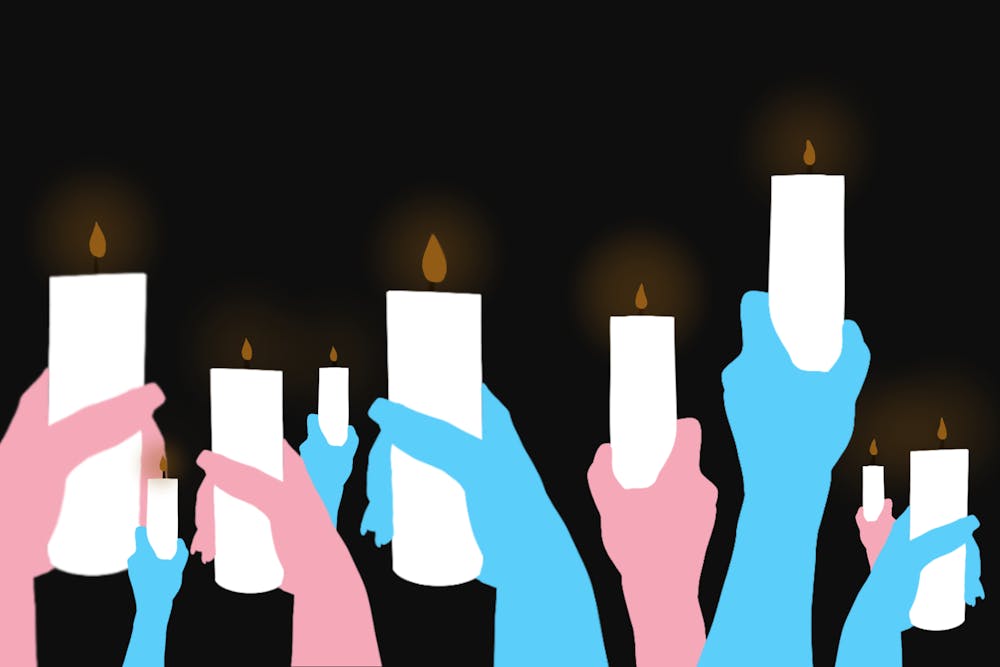Transgender Day of Remembrance is a time to acknowledge and reflect on those who have been killed and experienced violence because of transphobia.
The first Transgender Day of Remembrance was in 1999 after a transgender woman, Rita Hester, was murdered in 1998. Gwendolyn Ann Smith honored Hester’s memory along with all of the other transgender people who had been killed. Every year since then, Transgender Day of Remembrance, occurring on Nov. 20, has been observed across the world.
“It’s very much a day similar to the day to memorialize the PULSE nightclub shooting, the day to memorialize World AIDS Day, because that keeps people’s stories alive, and it keeps these very real fears to the forefront of our minds,” said Caroline Wallace, the assistant director for LGBT education in the Office of Multicultural Student Affairs (OMSA).
According to Transrespect Versus Transphobia, 350 known trans people were murdered worldwide in 2020. This number has been climbing since 2008, and 98% of those deaths are trans women or transfeminine people. In the U.S., it’s people of color that make up a large portion of deaths.
On Transgender Day of Remembrance, OMSA will show transgender plays in the Russell House and be tabling on Greene Street. Other organizations, like the Transgender Student Alliance (TSA), will post the names of those who have died on social media. TSA will also promote trans artists and is partnering with several Gay-Straight Alliance chapters at local high schools to write letters to TSA members' younger selves to give high school students perspective and advice about life moving forward.
“One of the things we’re trying to do at TSA is not only provide a safe space for our trans students, but also, you know, try to do a little bit of education and as much of visibility as we feel is safe just to educate the rest of campus,” said Matthew Ward, a fourth-year English student and president of the TSA.
USC highlights several other local and South Carolina-based organizations that trans students can go to for support. One group is We Are Family, based in Charleston, South Carolina. They offer training around South Carolina to help others learn more about the issues that affect the LGBTQIA+ community. They have partnered with members of the Harriet Hancock LGBT Center in downtown Columbia as well.
“We do do trainings through our LGBT Teach program, where we do, like I said, training for businesses, churches, groups, schools, all that stuff,” said Jonatan Guerrero Ramirez, the closet case thrift store manager for We Are Family. “We can do training on creating a more gender-inclusive space, being more accessible to folks."
OMSA offers several resources for transgender students as well. They assign housing based on gender identity, have trans-aware mental health providers, allow students to change their name and pronouns on Blackboard, GarnetGate and MyHealthSpace, offer trans advocacy training sessions and provide all-gender restrooms across campus.
While Ward said he is thankful for OMSA, he said there is always work to be done. One issue he has brought up to OMSA is avoiding the use of Microsoft Teams, as people cannot change their names on the program since the accounts are locked to their school account and their legal name.
In August, protesters came to campus with anti-LGBTQIA+ signs and were met by student counter-protesters. According to Ward, Individuals Respecting Identities and Sexualities (IRIS) and TSA were “pretty upset” the group was allowed on campus.
“I really want USC to be a community of diverse people, and even if people don’t want that, we are still here. There are going to be trans students, and there are going to be students of color, regardless of, you know, what old white dudes who have nothing better to do think,” Ward said. “So, it was really disheartening, but I was very proud of everybody who did come out and come to the protests. And that felt much less lonely than just knowing that they were here.”
According to Wallace, transgender people can face discrimination in healthcare, jobs, school and sometimes in their own homes. Transgender individuals are often at a higher risk of being low income because of job discrimination, unsupportive families or less access to higher education. For this reason, many cannot afford healthcare.
“I do not want to ever paint the trans experience as only sad, only scary, because I do believe that as people continue to come out, as people continue to live their lives, as younger generations see older generations coming out and having families and children and being able to get medical intervention if they want it, in living their lives as trans people, that helps younger trans people to understand that they have a life,” Wallace said.

